Becoming a dentist: faculty perceptions of student experiences with threshold concepts in a Canadian dental program
DOI :
https://doi.org/10.36834/cmej.43351Mots-clés :
Threshold Concepts, Dental Education, Curriculum Development, Professionalism, PhenomenographyRésumé
Background: In each discipline, there are moments where students “get stuck” in their education and/or training and are often unable to move forward. These moments may be caused by threshold concepts as they represent a portal that students must cross in order to become successful in their chosen profession. This study investigated the threshold concepts from the instructors’ perspective that students must navigate as they transform from learners to dentists within a dental program.
Methods: Two focus groups with faculty members within the School of Dentistry, University of Alberta were completed in the fall of 2017. Focus groups explored the faculty’s perception of the students’ transition from learner to dentist, difficult moments in the program, and the students’ ability to navigate the program successfully.
Results: A qualitative phenomenographic analysis of the faculty focus group transcripts identified four potential threshold concepts within the dental program: 1) dealing with the whole patient, 2) accountability, 3) that you may not know everything, and 4) problem solving and adapting during practice.
Conclusion: This study demonstrates that there are concepts within a dental program that faculty believe students must navigate in order to transition from learner to dentist. These concepts may inform curriculum design as well as other disciplines in the health sciences.
Téléchargements
Publié
Numéro
Rubrique
Licence
La soumission d’un manuscrit original à la revue constitue une indication qu’il s’agit d’un travail original, qu’il n’a jamais été publié et qu’il n’est pas envisagé pour publication dans une autre revue. S’il est accepté, il sera publié en ligne et ne pourra l’être ailleurs sous la même forme, à des fins commerciales, dans quelque langue que ce soit, sans l’accord de l’éditeur.
La publication d’une recherche scientifique a pour but la diffusion de connaissances et, sous un régime sans but lucratif, ne profite financièrement ni à l’éditeur ni à l’auteur.
Les auteurs qui publient dans la Revue canadienne d’éducation médicale acceptent de publier leurs articles sous la licence Creative Commons Paternité - Pas d’utilisation commerciale, Pas de modification 4.0 Canada. Cette licence permet à quiconque de télécharger et de partager l’article à des fins non commerciales, à condition d’en attribuer le crédit aux auteurs. Pour plus de détails sur les droits que les auteurs accordent aux utilisateurs de leur travail, veuillez consulter le résumé de la licence et la licence complète.











